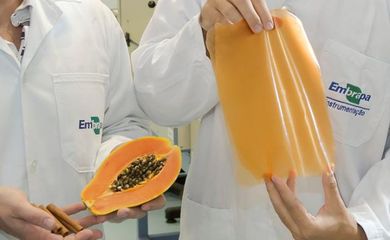Researchers use GM soy to produce anti-HIV protein


Researchers at Brazil's Agricultural Research Corporation have successfully extracted and purified cyanovirin-N grown in genetically modified soybeans

Biotechnology is increasingly pointing out new directions for the pharmaceutical industry. The latest news is that researchers at Brazil's Agricultural Research Corporation (EMBRAPA) have successfully extracted and purified cyanovirin-N grown in genetically modified soybeans. Cyanovirin-N is a protein found in cyanobacteria that can prevent HIV from proliferating in the human body.
The study published in Science magazine confirmed that GM soybean seeds are currently the most effective biofactory and a viable alternative for producing the protein in large scale. “We have been working to achieve this for five or six years. We have successfully accumulated a large amount of cyanovirin in soybeans and purified it,” said Elíbio Rech, a researcher at EMBRAPA Genetic Resources and Biotechnology.

Elíbio Rech, a researcher at EMBRAPA Genetic Resources and Biotechnology
Scientists have been researching biofactories for cyanovirin since 2005 in collaboration with the United States National Institutes of Health (NIH) and the University of London. Their aim is to produce a gel with virucidal properties that can be applied to the vagina before sexual intercourse.
The researcher pointed out that the gel is not a vaccine against AIDS or an alternative to condoms, but an important complement to these. “We are primarily focusing on Africa, where many women are infected with HIV by their partners. In a number of cultures, people haven't completely adhered to using condoms. With this [new] product [we are developing], women no longer depend on their male partners' willingness to use a condom – they take [AIDS] prevention in hand,” the researcher explained.
EMBRAPA says GM soybeans grown in greenhouses smaller than a baseball field (97.54m) can provide enough cyanovirin to protect a woman for 90 years.
Biopharmaceuticals
Biopharmaceuticals, or biological medical products, are obtained from biological sources and processes, through the industrial use of microorganisms or GM cells. The relevant genes are inserted into plant genomes that can emulate their properties and, from that point, modified proteins identical to the original ones can be produced in large scale.
Elíbio Rech explained the study was originally focused on agriculture. “Then we began to consider the use of soybeans and tobacco beyond agribusiness, extending it to the pharmaceutical industry and the industrial sector,” said the researcher, who also works with tobacco as biofactories.
According to him, research on biopharmaceuticals feeds into the pharmaceuticals market, helping make the drugs available to consumers at a lower cost and adding even more value to Brazil's agribusiness by adding value to the crops.
Rech noted EMBRAPA has completed its task of producing the technology asset. This technology will now be sent to laboratories and partner institutes for clinical trials and subsequently passed on to the industrial sector.
More partnerships
For the next development phases to produce the virucidal gel, researchers will begin a partnership with the South African Council for Scientific and Industrial Research (CSIR). EMBRAPA expects developing countries with high HIV infection rates will be given royalty-free licenses to produce and use the product internally.
Along with other institutions, EMBRAPA is also researching biofactories to produce the IX factor, an enzyme used for treating hemophilia B, a genetically inherited blood disorder which leads to loss of mobility.

"Soy is an awesome plant, and we can engineer it, learn about its entire genome, and then manipulate it in any way we want to",Rech said
The researchers are also working to develop a soybean that can produce human growth hormones (HGH), and to isolate genes found in Brazilian spiders in order to develop synthetic fibers that are as flexible and resistant as those of cobwebs. In order to explain the potential uses of that fiber, Rech compared it to plastic, i.e. pretty much everything.
There is a reason why the researcher is working so hard with soybeans. Besides the fact that Brazil has a well-established soy production system, it is biologically ideal because 40% of the seed is proteins, and the rest is oil. “Soy is an awesome plant, and we can engineer it, learn about its entire genome, and then manipulate it in any way we want to,” he concluded.
Translated by Mayra Borges
Fonte: Researchers growing GM soy with anti-HIV protein




